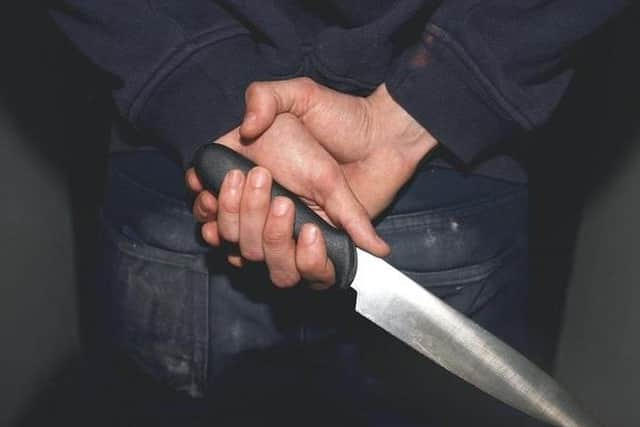More than a dozen repeat knife criminals in Hertfordshire spared prison
and live on Freeview channel 276
More than a dozen adult criminals caught carrying knives for at least a second time in Hertfordshire were spared an immediate prison sentence last year, figures reveal.
Anti-knife campaigners say they are concerned 'leniency' toward repeat offenders from the country's criminal justice system is undermining their efforts.
Advertisement
Hide AdAdvertisement
Hide AdMinistry of Justice data shows there were 49 cases where an offender was convicted or cautioned again over possession of a knife or offensive weapon in Hertfordshire in the year ending in March.


Of those cases, 27 saw the culprit given an immediate jail sentence, while 16 resulted in a suspended sentence and two in a community order.
It meant in 18 cases the repeat offender was not sent straight to prison, despite the law outlining that adults already convicted of the crime should face a minimum six-month jail term under the "two strikes and out" system brought in six years ago.
However, the outcome was not specified in four more cases which had not reached sentencing or had been dealt with by another means, such as a fine or a discharge.
Advertisement
Hide AdAdvertisement
Hide AdAcross England and Wales, 1,362 (34 per cent) of 4,036 knife possession cases involving an offender previously convicted or cautioned did not result in an immediate jail sentence in 2020-21.
However, the outcomes for 314 were not specified.
The Ministry of Justice said the rate of immediate prison sentences had been impacted by the pandemic, with a higher number of cases not reaching sentencing on time compared to previous years.
It also said there had been an increase in suspended sentences, possibly down to cases of coronavirus in the prison system.
But the Ben Kinsella Trust – a charity campaigning against knife crime in the name of the teenager stabbed to death in 2008 – said the criminal justice system must regard carrying weapons with the "severity that it deserves".
Advertisement
Hide AdAdvertisement
Hide AdChief executive Patrick Green said: "We are committed to preventative and targeted approaches to put an end to knife crime, but for those who consistently reoffend we rely on the criminal justice system to play a major role in our ongoing struggle.
"The figures raise concern about the criminal justice system's effectiveness at reducing weapon carriers on our streets.
"The leniency of the sentencing suggests an inappropriately weak response."
Although the MoJ warns any repeat knife offender should expect an immediate prison sentence, there is currently no minimum sentence for someone caught carrying a knife or offensive weapon for the first time.
Advertisement
Hide AdAdvertisement
Hide AdIn total, 199 cases of knife possession – including offenders aged under 18 – led to convictions and cautions in Hertfordshire in 2020-21, down from 282 the year before. It was also the lowest number recorded since comparable figures began in 2011.
Detective Chief Inspector Graeme Walsingham, from Safeguarding Partnerships and Policies said: “Dealing with habitual knife carriers and repeat offenders is a key part of Hertfordshire’s Serious Violence Strategy.
“The Constabulary uses intelligence to direct its stop and search powers towards individuals we know are likely to be carrying knives, which can lead to more arrests for knife related offences.
"These individuals are also identified by our investigators and targeted by our local policing and special operation teams dealing with violent crime when carrying out disruption activities.
Advertisement
Hide AdAdvertisement
Hide Ad“Our officers take a problem solving approach and focus on individuals, addresses and areas associated with violent crime.
"As part of our longer term strategy we have invested in prevention of and diversion from this type of crime and the associated violence, and our Gangs and Schools team work within schools and with children who are at risk of becoming involved in knife and violent crime, providing early intervention, learning and messaging for the young people and their families to deter repeat offending or escalation of offending.
“The processes of dealing with offenders related to violent crime is constantly under review and we are looking to develop an even more targeted approach to addressing the issues in the county."
It reflected the national picture, with that figure also dropping across England and Wales to 16,292 convictions and cautions, from 18,721 in 2019-20.
Advertisement
Hide AdAdvertisement
Hide AdThe MoJ said sentencing remained the responsibility of independent judges.
A MoJ spokesperson added: "Those caught carrying a knife are more likely to be sent to jail and for longer than they were a decade ago.
“We are also recruiting 20,000 extra police officers, making it easier to use stop and search and ensuring the most serious offenders spend more time behind bars to protect the public."
The Judiciary Office said any sentence given by a judge or magistrates was considered "carefully" using law and sentencing guidelines.
A spokesperson added: "They also take into account any aggravating or mitigating factors which could increase or reduce the sentence."